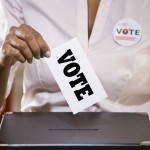 The gender pay gap is stubbornly persisting despite repeated efforts to make workplaces fairer and more egalitarian. Recent research from Bocconi University reminds us, however, that the impact of the gap extends beyond the workplace into areas of society we may not ordinarily think of.
The gender pay gap is stubbornly persisting despite repeated efforts to make workplaces fairer and more egalitarian. Recent research from Bocconi University reminds us, however, that the impact of the gap extends beyond the workplace into areas of society we may not ordinarily think of.
The research reveals that electoral districts with a high gender pay gap seem to favor male candidates and have fewer female candidates on the ballot.
The findings emerged after assessing data from seven parliamentary elections held in France from 1988 to 2017. Candidates from both sides of the political spectrum were assessed alongside data on voters’ attitudes to things such as gender and equality. The researchers also gathered earnings data and demographic information from the census.
Unequal representation
The analysis found that female candidates represented around 15% of candidates throughout the 1980s and 1990s, before leaping to almost 30% after the Parity Law was introduced in 2000. This law mandated that each party must have an equal proportion of male and female candidates across electoral districts. If parties don’t comply with the law, they face financial penalties.
The study also found that there was a strong correlation between the gender pay gap and electoral gaps across municipalities within the same district. A €150 increase in the monthly gender pay gap was linked to a 0.6% increase in vote shares between male and female candidates.
It appears that female candidates were securing a lower share of the votes in areas that also had a less favorable attitude towards women, which was reflected in the gender pay gap. This not only meant a lower share of the vote for women but also appeared to discourage women from running in the first place.
The researchers believe that the results show that in districts with strong electoral competition, the potential risk of selecting women outweighs any possible penalties they could incur for not doing so under the Parity Law.
“Overall we find that parties allocate female candidates across districts strategically,” the researchers conclude. “This is very clear after the introduction of the Parity Law. Then parties avoid putting women on the ballot of the most contested districts. In such districts, voters biased against female politicians may lead women to lose the few votes that matter for winning the close race, and parties internalize this competitive disadvantage.”